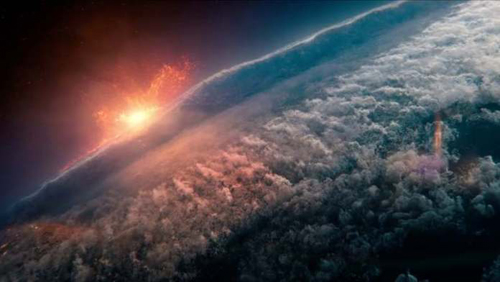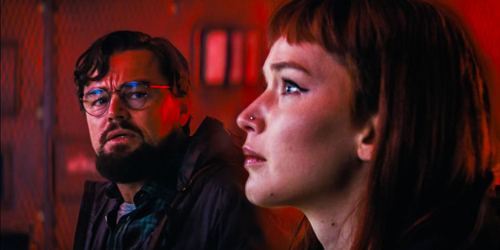
Your complimentary articles
You’ve read one of your four complimentary articles for this month.
You can read four articles free per month. To have complete access to the thousands of philosophy articles on this site, please
Films
Don’t Look Up
Dylan Skurka marvels at the human capacity to ignore existential threats.
One morning in the marketplace, as the townspeople are enjoying what they think is the beginning of a day like any other, a dishevelled man holding a lantern appears out of nowhere. “I seek God! I seek God!” he begins to scream indiscriminately at both no one and everyone. Soon enough, a crowd forms around this spectacle of a person, and once they understand what’s happening, the townspeople can’t help but burst into laughter at the ridiculous sight of someone crazy enough to be out looking for God with a lantern. The madman, getting more and more impatient about not being taken seriously, finally snaps back at his audience: “Where is God? I will tell you. We have killed him – you and I!”
Dumbstruck, the townspeople aren’t laughing anymore, and now just stand there in a daze. Fed up with his failed efforts to be heard, the madman finally smashes his lantern on the ground in one last fit of rage, and leaves, issuing the townspeople a last cryptic warning:
“I have come too early; my time is not yet. This tremendous event is still on its way, still wandering; it has not yet reached the ears of men. Lightning and thunder require time; the light of the stars requires time; deeds, though done, still require time to be seen and heard. This deed is still more distant from them than most distant stars – and yet they have done it themselves.”
(The Gay Science, Friedrich Nietzsche, 1882)
Nietzsche’s parable of the madman, written at the end of the nineteenth century, proved to be eerily spot on. The Western world was for the most part blissfully ignorant of the fact that at that time science and atheistic criticism were busy replacing (or to use Nietzsche’s terminology, killing) God as the main source of truth, and even less aware of how disastrous the death of God would prove to be (cf the nihilistic despair that would soon propel the rise of National Socialism, Communism, and catalyze World Wars I & II). To call such a large philosophical spade a spade back then, though, proved to be too incomprehensible for most people to wrap their heads around, and so the Nietzschean prophets were happily dismissed as raving lunatics. They had come too early; their time was not yet.
Fast forward to today. Imagine that you wake up one morning, and check the digital marketplace called ‘Twitter’ as you roll out of bed. You see a video dominating your feed – a man screaming that a comet is six months away from hitting Earth and that “We’re all gonna die!” Certain that this is some kind of sick joke, you do some research, and learn that the screaming man is actually a well-respected astronomer, and that his findings are backed by a number of peer-reviewed journals.
How would you react to this? For that matter, how would the world react?
These are a couple of the questions that the wildly ambitious Adam McKay film Don’t Look Up (2021) tackles, and if you tend to see the good in humanity and are optimistic that we’ll always prevail no matter what catastrophe comes our way, you might find yourself feeling a bit dejected once the final credits roll around. Okay, maybe very dejected.

Film Images © Netflix 2021
Comet? No Comment
The film begins with a discovery made by Michigan State astronomy PhD student Kate Dibiasky (Jennifer Lawrence) and her supervisor Dr Randall Mindy (Leonardo DiCaprio), who learn to their shock and horror that a comet the size of Everest is six months away from striking Earth and causing mass extinction.
You might think that this sort of information would be easy to get across to people, and that everyone’s highest priority once they got the message would be to do everything in their power to stop the comet from hitting Earth, and that the seriousness of the situation would make all of those stupid, inconsequential worries or fixations that consume everyone’s lives disappear. But have you seen humanity lately? In contrast to the abrupt threat that a collision with a massive object from outer space poses in the movie, the world in which we actually live faces the existential threat of a rapidly changing climate. Climate change, to be sure, is a much less sexy apocalypse, since it’s gradual rather than instantaneous, but both paths lead to the same result: if we don’t act quickly, we’re screwed. Kate and Randall realize this immediately after making their discovery.
The first part of the film explores the nausea-inducing anxiety the two share in carrying the weight of having to break this colossally bad news to the public. Their first order of business is to tell the President of the United States (the Trump-like Janie Orlean, played by Meryl Streep) what’s going on, so that they can be given the green light to execute a plan to protect the Earth from the comet. The following back-and-forth ensues:
Orlean: What is this going to cost me? What’s the ask here?
Mindy: There are government plans in place, actions we can take through NASA, drones that can be outfitted with nukes to deflect and hopefully change the orbit of this comet. We must act now.
Orlean: (Mildly irritated) Okay, alright, alright, alright. When are the midterms? Three weeks? So if this breaks before then, we lose Congress, and then there’s nothing we could do anyway. The timing is just… atrocious. At this very moment I say that we sit tight and assess.
Dibiasky: Am I to understand correctly that after all the information you received today, the decision you are making is to sit tight and assess?
Orlean: I have a job to do.
The so-called ‘dignified leader’ of their country, Kate and Randall quickly learn, is completely useless in dealing with a world-threatening crisis.
To make matters worse, seemingly everyone else to whom the two turn for some help – or at the very least, for some validation – is equally aggressively oblivious. For example, after making their way on to the popular talk show The Daily Rip, and revealing their horrifying discovery once again to its hosts, all they get back are vapid pleasantries and bad jokes: “Okay, well, as [the comet is] damaging, will it hit this one house in particular that’s right on the coast of New Jersey? It’s my ex-wife’s house!” To make matters worse, the audience of the show barely reacts to the revelation of the incoming apocalyptic event – but does react to the meltdown Kate has after being fed up with not being taken seriously by people poking fun at her with memes! Randall, on the other hand, keeps his composure, and is embraced by the public as a likable scientist; but, once again, the obvious point is missed: that a comet is six months away from catastrophically hitting the Earth and that action needs to be taken immediately.
Even Randall and Kate prove not to be impervious to their own distractedness, as Randall gets caught up in his newfound celebrity as a public figure, and nothing seems to bother Kate more than the fact that she’s scammed into paying for free snacks while she waits for the President to arrive at the White House.
In the end [spoiler alert], after the President momentarily agrees to follow through with a plan to destroy the comet, in a desperate attempt to regain public support after she’s involved in a scandal, she eventually backs out when a billionaire tech guru convinces her that the comet can be mined for valuable resources.

Randall and Kate look up
Unbelievable Truths
As I watched these scenes unfold, partially broken, partially amused, I couldn’t figure out what was more insane: the fact that the majority of the characters in this film couldn’t figure out that things such as job security, financial gain, and public image are completely meaningless if no one’s alive to enjoy them; or the fact that the film was so reflective of real-life that it didn’t even feel like a satire. To top it off, put yourself in the shoes of the characters: are you certain that you wouldn’t be so absurdly short-sighted yourself? I can’t say for sure that I wouldn’t be.
Needless to say, by the time the gravity of the situation finally begins to kick in (pun intended), it’s too late. The world cannot be saved anymore. Once Randall comes back to his senses after being drunk on his own celebrity, he smashes his own proverbial lantern on live television and offers a feverish monologue of Nietzschean proportions:
“Would you please just stop being so f***ing pleasant? I’m sorry, but not everything needs to sound so clever or charming or likable all the time. Sometimes we just need to be able to say things to one another – we need to hear things… If we all can’t agree at the bare minimum that a giant comet the size of Mount Everest hurdling it’s way towards planet Earth is not a f***ing good thing, then what the hell happened to us? I mean, my God, how do we even talk to each other? What have we done to ourselves?”
What ultimately makes Don’t Look Up so unsettling is that it’s difficult to see how the real world would fare differently in comparison to the satire. Will politicians ever not prioritize the success of their campaigns over the principles for which their campaigns supposedly stand? Will media outlets ever not prioritize new flashy headlines over very familiar but still pressing problems? Will the rest of us as a group ever not prioritize our own immediate interests and distractions over the long-term interests of the human species as a whole?
You might say that to do otherwise – to really face the darkness of our times head-on – would be enough to drive someone mad. When it really comes down to it, though, what’s actually crazier: to be so in touch with a dark reality everyone else ignores that you lose your mind in the process? Or to be so caught up in the trivialities of your own life that you fail to even notice that you’re in danger in the first place?
When the townspeople laughed at the madman who warned them that God was being killed, they failed to see that the joke, in the end, was on them.
© Dylan Skurka 2022
Dylan Skurka is a Philosophy PhD student at York University in Canada. His research focuses on the philosophy of psychology, existentialism, and environmental ethics.









